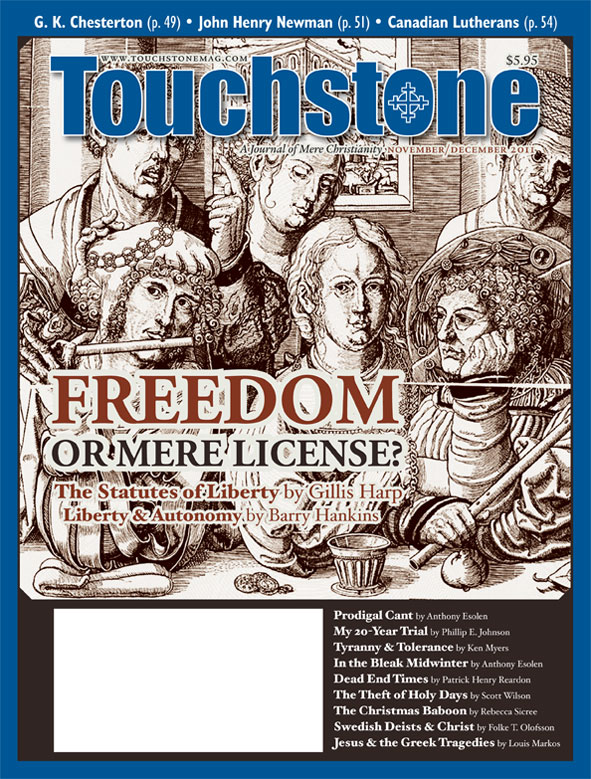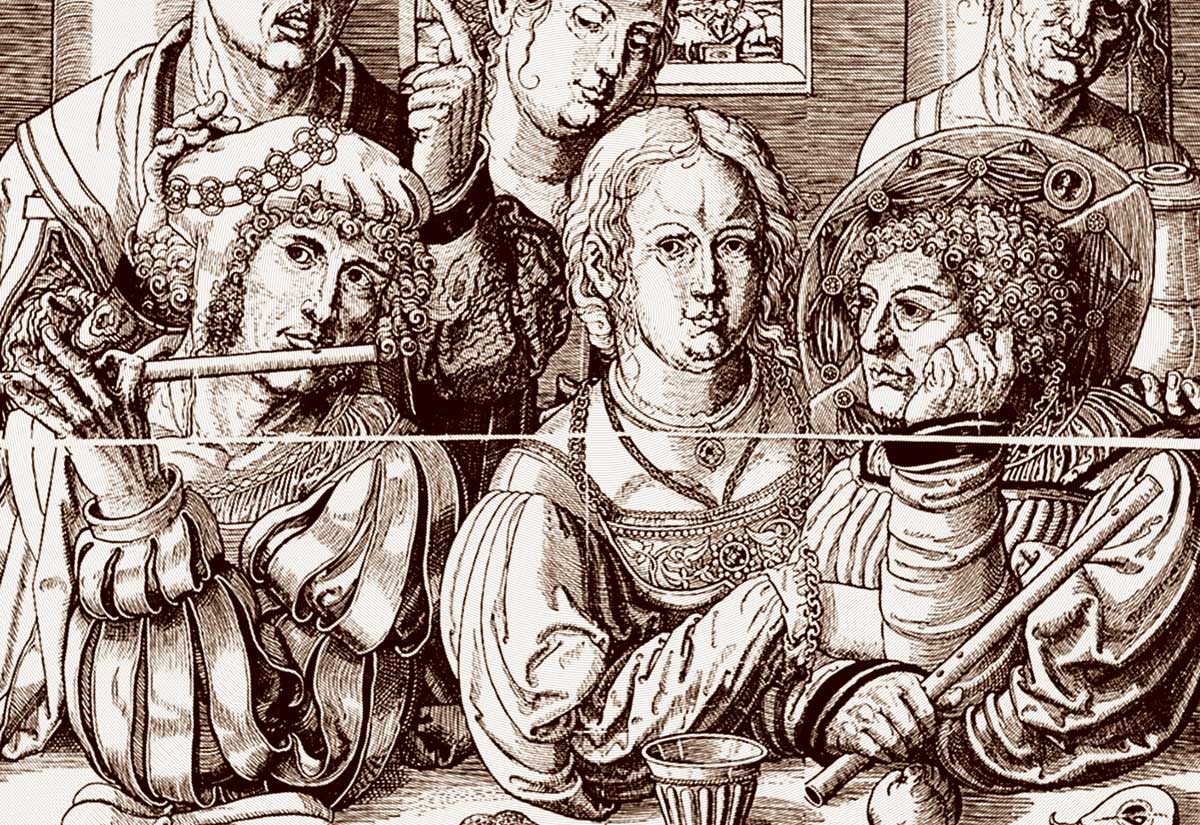A Measured Life
G. K. Chesterton: A Biography
by Ian Ker
Oxford University Press, 2011
(747 pages, $65.00, hardcover)
reviewed by James E. Person Jr.
Some great men are diminished by in-depth biographies, by delving into hidden aspects of a famous life. But in Ian Ker’s magisterial biography, the six-foot-four, 300-pound G. K. Chesterton (1874–1936), England’s most famous literary convert to Roman Catholicism during the last century, seems somehow larger.
A parish priest and teacher of theology at Oxford University, Ker is the author of a major work on John Henry Newman. In researching and writing his latest biography, he was struck by the parallels between Chesterton and Newman, each a convert to and apologist for Catholicism, each preeminently a formidable controversialist.
Ker covers much ground that has already been sifted by biographers Maisie Ward, Ian Boyd, and Michael Ffinch, among others, but he supplies richer detail than his predecessors, making fine use of insights gleaned from Chesterton’s letters; the diaries of Chesterton’s wife, Frances; largely unnoticed biographical details lying in plain sight within Chesterton’s magazine and newspaper articles; and the secondary literature, most notably William Oddie’s masterly Chesterton and the Romance of Orthodoxy: The Making of GKC, 1874–1908 (2008).
The Works
Ker intersperses the biographical narrative with telling insights from Chesterton’s major works, as well as relevant, if passing, references to his lesser-known writings. It is a mammoth task to digest the work of a man who wrote roughly one hundred books, thousands of newspaper essays, a few plays, six novels—chief among them The Man Who Was Thursday (1908)—and hundreds of poems, including The Ballad of the White Horse (1911), a heroic epic that English soldiers shouted out amid the roar of battle during World War I. Factor in as well the numerous short stories Chesterton wrote, including five volumes’ worth of stories featuring the humble priest-detective Father Brown. Ker has managed the task of sorting through and discussing these works, and the philosophy behind them, in a fresh, insightful manner.
His summary of Chesterton’s classics The Everlasting Man (1925) and St. Thomas Aquinas (1933) may be the best assessments of those works yet published. Ker is especially strong where he writes of these and the handful of other works for which Chesterton is especially renowned—Robert Browning (1903), Heretics (1905), Charles Dickens: A Critical Study (1906), Orthodoxy (1908), and the Autobiography (1936).
From Chesterton’s nonfiction works in particular Ker not only chooses various treasures, but extracts their essence from them, building a strong case that Chesterton “should be seen as the obvious successor to Newman, and indeed as a successor to the other great Victorian . . . non-fiction prose writers, Carlyle, Ruskin, and Arnold (the critic)”—which is not surprising, since Chesterton seems to have read and absorbed every English work ever published and himself drawn out the vital essence of each. He could express his thoughts on books, ideas, people, politics—seemingly every subject under the sun—in a manner that was engaging, fun, and knowledgeable without being pedantic.
The Man
The man behind the words was himself a fascinating individual. In one of his finest Father Brown stories, we hear the priest-detective speak of the unique, dual nature of man, “with his strange and wicked and yet half-heroic heart.” This was a pervasive theme in Chesterton’s work, and his own life reflected that duality. Yes, he was the generous, rollicking, good-hearted man depicted in almost every biographical portrait, but he also had a selfish side that is less remarked upon. To his credit, he recognized the unattractive traits in himself and strove to overcome them. Soon after his conversion to Roman Catholicism in 1922, he wrote a letter to Ronald Knox that reveals a side to the great man that many admirers never imagined:
James E. Person, Jr. is the author of Russell Kirk: A Critical Biography of a Conservative Mind (Madison Books), as well as Earl Hamner: From Walton's Mountain to Tomorrow (Cumberland House Publishing), and is a longtime book reviewer. He has written on Kirk and on Evelyn Waugh for Touchstone.
subscription options
Order
Print/Online Subscription
Get six issues (one year) of Touchstone PLUS full online access including pdf downloads for only $39.95. That's only $3.34 per month!
Order
Online Only
Subscription
Get a one-year full-access subscription to the Touchstone online archives for only $19.95. That's only $1.66 per month!
bulk subscriptions
Order Touchstone subscriptions in bulk and save $10 per sub! Each subscription includes 6 issues of Touchstone plus full online access to touchstonemag.com—including archives, videos, and pdf downloads of recent issues for only $29.95 each! Great for churches or study groups.
Transactions will be processed on a secure server.
more from the online archives
calling all readers
Please Donate
"There are magazines worth reading but few worth saving . . . Touchstone is just such a magazine."
—Alice von Hildebrand"Here we do not concede one square millimeter of territory to falsehood, folly, contemporary sentimentality, or fashion. We speak the truth, and let God be our judge. . . . Touchstone is the one committedly Christian conservative journal."
Support Touchstone
—Anthony Esolen, Touchstone senior editor









